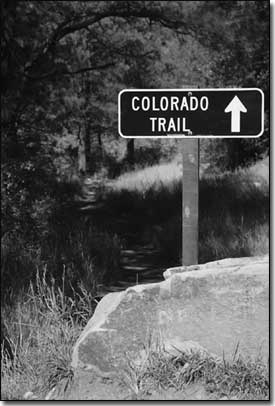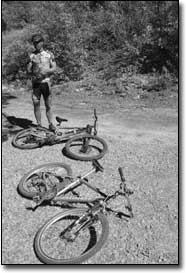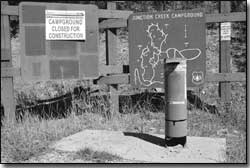|
Public lands ‘passport’ clears
legislative hurdleby Will Sands
 |
A sign points trail users in
the right direction at the Colorado Trail. Under
proposed
legislation, users of public lands would be required
to carry an “America
the Beautiful” pass which would cost $85
or more./Photo by Todd Newcomer. |
R ecreation on public lands could carry a hefty admission price in
the near future. Hikers, bikers, hunters and all users of public lands
may have to start carrying a “passport” if a U.S. Congressman from the
Midwest get his way. Last week, a bill that would permanently authorize
the Recreation Fee Demonstration Program passed quickly out of committee.
As a result, critics fear that all users could be hit by new fees, even
in places like the local San Juan National Forest, where such fees currently
are not required.
The notorious Recreation Fee Demonstration program, or Fee Demo, was
first enacted eight years ago as a test project for increasing public
lands revenues. The program creates new recreation fees to be reinvested
in recreation areas. Fee Demo applies to Forest Service, National Park
Service, Bureau of Land Management, and U.S. Fish and Wildlife Service
lands. Opponents have charged that Fee Demo represents double taxation
and an illegal taking of public property rights. Advocates counter that
a boom in recreational use combined with dwindling revenues has led
to damage to public lands. Earlier in the year, the Senate unanimously
passed a bill that made Park Service fees permanent and called for Fee
Demo to lapse at the end of 2005.
Last week, a bill proposed by Rep. Ralph Regula, R-Ohio, charted a
different course for Fee Demo and quickly passed the Senate Interior
Appropriations Committee. The bill would permanently authorize Fee Demo
by requiring all public lands users to carry an “America the Beautiful” pass
before setting foot or tire on any of the nation's 640 million acres
of public lands. On top of a basic annual fee of $85 or more, expanded
fees would be required for amenities like campgrounds and boat launches.
Another layer of fees would be applied to group activities and motorized
recreation. Recreating without the pass would result in a $100 ticket
for first-time offenders. After a second infraction, the offense leaps
up to a Class B misdemeanor punishable by six months in jail and/or
a $5,000 fine.
Opponents of Fee Demo are outraged that Regula's bill exists at all.
“You should not have to have a pass of that sort to use public lands
that you already pay taxes to maintain,” said Robert Funkhouser, president
of the Western Slope No-Fee Coalition.
Funkhouser added that Regula's bill goes too far in requiring the public
to pay for everyday use rather than special services like campgrounds.
“The public doesn't really oppose paying for services above and beyond
standard use,” he said. “But this bill goes way too far and is over
the top.”
 Kitty Benzar, a Durango resident and member of the Western Slope No-Fee
Coalition, said that the push would also bring fees into the local forest
for the first time. Currently, there is only one Fee Demo site in Southwest
Colorado, the Anasazi Heritage Center, and it charges a $3 entrance
fee. Under the new circumstances, locals would be required to carry
the pass when accessing standard recreational getaways like Animas Mountain,
Horse Gulch or the Colorado Trail. Kitty Benzar, a Durango resident and member of the Western Slope No-Fee
Coalition, said that the push would also bring fees into the local forest
for the first time. Currently, there is only one Fee Demo site in Southwest
Colorado, the Anasazi Heritage Center, and it charges a $3 entrance
fee. Under the new circumstances, locals would be required to carry
the pass when accessing standard recreational getaways like Animas Mountain,
Horse Gulch or the Colorado Trail.
“This would bring Fee Demo to this area,” Benzar said. “It would go
everywhere. The local land managers would have no say.”
The opposition is further outraged that Regula's bill passed through
committee so easily. They cited circumstances in which Rep. Nick Rahall,
D-W. Virginia, was alone in voicing concerns about the passport and
added that no representatives from Western states spoke against the
bill.
“It is disappointing that western congressmen and other members of
both parties, who have voted before to oppose forest recreation fees,
raised not a word of protest against a permanent, multi-agency recreation
fee bill,” Funkhouser said.
Benzar added, “We don't like the direction things are heading in at
all. We feel like we're being betrayed by people in Congress who once
opposed Fee Demo. This just shows that we don't really own our public
lands at all. Ralph Regula does.”
Advocates of Fee Demo take a different view of Regula's bill and Fee
Demo in general. They fear that public lands will suffer
without the addition of revenue and are looking to the public to pick
up their own tab. Pam DeVore is the Recreation Fee Demonstration Program
administrator with the Rocky Mountain Region of the Forest Service. “Our
budgets are not keeping pace with inflation or the huge increase in
recreation we're seeing,” she said. “We've got
trash all over the place that needs to be picked up.
We've got places that need toilets. There are things
the public wants us to supply that we can't afford to supply.”
DeVore argued that the “America the Beautiful” pass would not only
increase revenues, it would simplify management. She said that there
are currently numerous passes issued for public land, including the
Golden Eagle, the Golden Age and the Golden Access. Agencies are also
given a menu of fees from Congress, according to DeVore.
 “It's very confusing,” she said. “It's almost impossible for us to
understand let alone the public. One of the things we've been trying
to get done is have one pass. The ‘America the Beautiful' pass would
do away with all these other passes and accomplish the same thing.” “It's very confusing,” she said. “It's almost impossible for us to
understand let alone the public. One of the things we've been trying
to get done is have one pass. The ‘America the Beautiful' pass would
do away with all these other passes and accomplish the same thing.”
Whether the “America the Beautiful” pass comes into being still depends
on a great deal of political wrangling. With the Legislative session
nearing its end, Congress will have to revisit this topic early in 2005
and quickly reach a compromise between Regula's bill and the recently
passed Senate recreation fee bills.
“Where it will go from here is what we're endeavoring to find out.” Funkhouser
concluded.
|